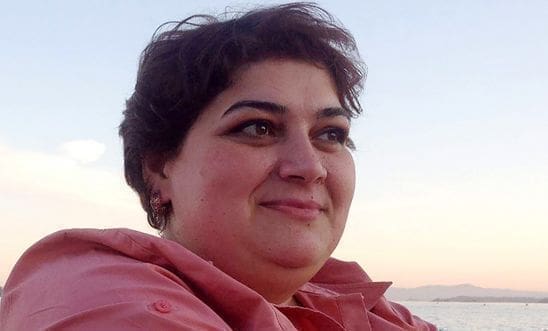On 10 January 2019, the European Court of Human Rights (ECtHR) delivered its judgment in the case of award-winning Azerbaijani journalist Khadija Ismayilova. Ms Ismayilova, an independent investigative journalist internationally known for her pro-democracy stance, was the target of a systematic smear campaign comprising threats, intimidations and gross violations of her privacy designed to prevent her from pursuing her journalistic work. Today the ECtHR found violations of Articles 8 and 10 of the European Convention on Human Rights by Azerbaijan in respect of these intrusions into her private life.
Ms Ismayilova began receiving threats after publishing a series of articles on government corruption involving the president of Azerbaijan and his family. In early 2012, she complained to the Azerbaijani authorities and, shortly afterwards, videos showing intimate scenes from her bedroom were published on the internet, seemingly recorded on hidden cameras illegally installed in her apartment. Azerbaijani state media widely referenced the videos and criticized Ms Ismayilova for ‘immoral behaviour’. Despite Ms Ismayilova’s continued requests, the Azerbaijani authorities showed no intention to effectively investigate either the threats or the gross violation of her privacy. Further, the authorities published a report publicly disclosing yet more private information about Ms Ismayilova, her friends and family. Having received no effective redress from the Azerbaijani national courts, in September 2013 Ms Ismayilova petitioned the ECtHR.
The ECtHR today held that the Azerbaijani authorities violated her Article 10 right to freedom of expression by failing to protect her in the exercise of that freedom: both by failing to effectively investigate her complaints and by actively publishing additional information relating to her private life, contrary to the “spirit of an environment protective of journalism”.
The ECtHR also held that there had been a violation of Ms Ismayilova’s Article 8 right to private life due to the Azerbaijani authorities’ failure to conduct an effective investigation into the “serious, flagrant and extraordinarily intense” invasion of her privacy, especially given there was a plausible link between these intrusions and her journalistic activity. In reaching its finding, the ECtHR noted the many leads that the authorities had failed to investigate and the significant delay to the proceedings in Azerbaijan. The ECtHR also held that the publication by the Azerbaijani authorities of information about Ms Ismayilova’s private life constituted a further breach of Article 8, stating that the authorities should have taken particular care in the circumstances not to compound the already existing grave breaches of her privacy.
This is an important judgment in support of press freedom in Azerbaijan, where there has been an increasing crackdown on independent journalism in recent years. In its judgment the ECtHR acknowledged the record of persecution of journalists in Azerbaijan and noted that this persecution, coupled with a climate of impunity, may produce a “grave chilling effect” on freedom of expression. The ECtHR once again stressed the fundamental role of freedom of expression in a democratic society and stated that the genuine, effective exercise of this freedom is not dependent merely on a state’s duty not to interfere with individuals’ right to freedom of expression, but also calls for states to effectively protect journalists and create a favourable environment for participation in public debate, enabling people to express their opinions and ideas without fear.
In response to the judgment today, Ms Ismayilova said:
I want to thank all my lawyers in Azerbaijan, at the Media Legal Defence Initiative, and at law firms De Brauw Blackstone Westbroek and WilmerHale, who worked on the case and all the organizations that intervened as third parties. Their support and great work was indispensable.
This decision proves that the Azerbaijani government is responsible for the heinous crime I was subject to.
It was a long legal fight, and I will continue demanding that the Azerbaijani government properly investigates the intrusion to my privacy and blackmail. I strongly believe that the Azerbaijani government officials were behind the secret filming and blackmailing, and my legal struggle will continue till the day when all perpetrators will be brought to justice.
Ms Ismayilova was represented by Azerbaijani lawyer Yalchin Imanov, MLDI, and international law firms Wilmer Hale and De Brauw Blackstone Westbroek. An amicus brief was also filed by a coalition of 14 free speech organisations.
The ECtHR’s decision can be found here.
Recent News
Landmark Ruling: Kenya’s High Court Declares Colonial-era Subversion Laws Unconstitutional
Media Defence welcomes the verdict of the High Court in Nakuru, striking down sections of the Kenyan Penal Code which criminalise subversion, citing them as relics of colonial oppression that curtail freedom of expression. Justice Samwel Mohochi, delivering the judgment, asserted that these provisions were overly broad and vague, stifling dissent rather than serving any […]
UN Rapporteurs Call for Protection of Brazilian Journalist Schirlei Alves
UN Rapporteurs Call for Protection of Brazilian Journalist Schirlei Alves Amid Defamation Charges Stemming from Rape Trial Coverage A letter dispatched by UN rapporteurs to the Brazilian Government calls for protective measures for women journalists covering cases of sexual crimes. The letter also denounces the conviction of Brazilian investigative journalist and women’s rights defender, Schirlei […]
Convite à apresentação de candidaturas: Cirurgia de litígio em português na África Subsariana
Cirurgia de litígio em português na África Subsariana Aplique aqui 23 a 25 de julho de 2024 em Nairobi, Quénia Prazo: 3 de maio A Media Defence está a convidar advogados sediados na África Subsariana que falem português a candidatarem-se a participar numa próxima cirurgia de litígio sobre o direito à liberdade de expressão e […]



